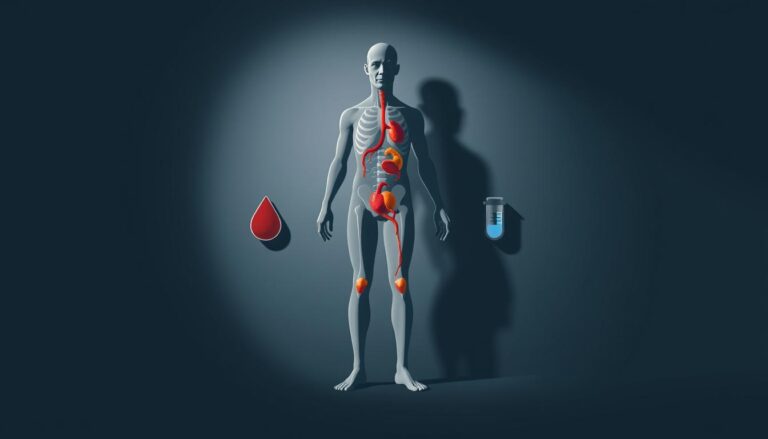How to Improve Overall Health with 7 Science-Backed Tips
Table of Contents
Your health journey is more than just a destination—it’s a transformative path. It can dramatically extend and enhance your life. Research shows that changing your lifestyle at 40 could add 10 extra years to your life. Even at 70, you can gain five or more years by making smarter health choices.
In a world where 60% of adult food is ultra-processed, understanding how to improve overall health is key. These science-backed tips will empower you. They will help you take control of your wellness and break free from harmful dietary patterns. You’ll also make sustainable lifestyle changes that protect your long-term health.
The science is clear: your daily choices profoundly impact your future. From nutrition to exercise, every decision affects your body’s complex ecosystem. This guide will walk you through practical, research-supported strategies. They will boost your healthy lifestyle and optimize your well-being.
Key Takeaways
- Small lifestyle changes can significantly extend life expectancy
- Ultra-processed foods pose serious health risks
- Diet plays a crucial role in preventing chronic diseases
- Age is not a barrier to improving health
- Consistent healthy habits lead to long-term wellness
Understanding the Impact of Modern Food Choices
Your diet is key to your health and happiness. Today, we eat differently, affecting our nutrition and health care.
The Reality of Ultra-Processed Foods
Ultra-processed foods are everywhere in our diets. They make up about 60% of what adults eat, even more for kids. These foods are full of:
- Artificial ingredients
- High sugar
- Too much sodium
- Little to no nutrients
How Food Choices Affect Long-Term Health
What you eat affects your health for years to come. Eating too much processed food can harm you, leading to:
| Health Condition | Dietary Risk Factors |
|---|---|
| Cardiovascular Disease | High trans fat and saturated fat intake |
| Type 2 Diabetes | Excessive sugar consumption |
| Mental Health Issues | Nutrient-poor diet |
The Connection Between Diet and Disease Prevention
Good health starts with what you eat. Eating whole, nutritious foods lowers disease risk. Plant-based diets are especially good for you, helping with weight control.
Knowing how food choices affect your health gives you power. Choose foods that support your long-term health.
The Science Behind Gut Microbiome and Overall Wellness
Your gut microbiome is a complex ecosystem that plays a crucial role in your holistic approach to wellness. Recent scientific discoveries reveal that this microscopic world inside you is far more powerful than previously understood. In fact, researchers have found that approximately 90% of serotonin and 50% of dopamine are produced right in your gut.
Understanding the gut microbiome’s impact on your health involves exploring its intricate connections to various bodily functions. A groundbreaking study analyzing 116 adults demonstrated remarkable links between gut bacteria and psychological resilience. The research uncovered distinct biological signatures that highlight the profound relationship between your microbiome and overall well-being.
- Gut bacteria influence mood and energy levels
- Dietary changes can modify microbiome composition within 10 days
- Approximately 70% of microorganisms reside in the large intestine
Nutrition plays a critical role in maintaining a healthy gut microbiome. Experts recommend consuming 25 to 35 grams of fiber daily to support beneficial bacteria. Fermented foods have shown promising results in reducing inflammation and supporting gut health. A trial from University College Cork even discovered that a diet focused on specific vegetables could help reduce perceived stress.
Your gut is essentially a “chemical factory” producing substances that directly impact brain function and emotional well-being.
The potential for future medical breakthroughs is exciting. Researchers believe that within the next decade, microbiome biomarkers could revolutionize treatment decisions for conditions like depression and anxiety. By embracing a holistic approach to wellness, you can nurture your gut microbiome and support your overall health.
To get better results, you can benefit from the benefits of this nutritional supplement
Transform Your Health Through Smart Food Choices
Nutrition is key to a healthy lifestyle. What you eat affects your energy, health, and well-being. Learning to make better food choices can change how you view eating and health.
Quality vs. Quantity in Nutrition
Not all calories are the same. Your body needs high-quality nutrients to function well. Sadly, most adults don’t eat enough fruits and veggies, missing out on important nutrients that fight disease.
- Prioritize nutrient-dense foods over calorie-dense options
- Choose whole foods with minimal processing
- Focus on nutritional value rather than total calorie count
The Role of Whole Foods
Whole foods give your body the nutrients it needs. Eating more fruits and veggies can cut heart disease risk by 20%. A diet full of fiber can even lower heart disease risk by up to 30%.
Timing and Portion Control
Eating at the right times and in the right amounts can improve your nutrition. Eating smaller meals more often can boost energy by 15%. Being mindful of your eating can also cut calorie intake by about 30%.
- Eat breakfast to boost metabolism by 10-30%
- Practice portion control
- Pay attention to hunger and fullness signals
Remember, your food choices are investments in your long-term health and well-being.
Improve Overall Health Through Movement and Exercise

Changing your health begins with the power of movement. Physical activity is key to wellness, not just for weight control. Studies show it boosts both physical and mental health.
The American Heart Association suggests 150 minutes of moderate exercise each week. It might seem hard, but it’s doable. Here are ways to add more movement to your day:
- Take short walking breaks during work hours
- Use stairs instead of elevators
- Try desk exercises during long sitting periods
- Engage in activities you genuinely enjoy
Regular physical activity offers many benefits. Active people see big improvements in health. Exercise can:
- Reduce risk of heart diseases
- Lower blood pressure
- Decrease risk of type 2 diabetes
- Improve mental health and mood
- Boost energy levels
You don’t need intense workouts to improve your health. Small, consistent movements can lead to big wellness changes. Begin with small steps, stay consistent, and listen to your body as you build a lasting exercise habit.
The Power of Mindful Eating Practices
Mindful eating changes how you see food. It links mental health and self-care by making you think about what you eat. Studies show that paying attention while eating can really boost your health.
Nutrition experts say mindful eating is more than just eating. It’s about knowing your body’s needs and enjoying each bite fully.
Understanding Your Body’s Hunger Signals
Your body tells you when you’re hungry or full in small ways. Learning to notice these signs can help you:
- Tell the difference between real hunger and eating because you’re upset
- Avoid eating too much by listening to when you’re full
- Have a better relationship with food
Practical Techniques for Conscious Eating
Using mindful eating can make your self-care routine better. Try these tips that are backed by science:
- Eat slowly and chew well – This helps your body feel full sooner
- Don’t eat with distractions like TV or phones
- Eat with your non-dominant hand to eat less by 30%
- Take 20 minutes to finish a meal
Studies show mindful eating can greatly help your mental health. About 70% of people felt better mentally by using these methods.
Mindfulness makes eating a mindful, enjoyable act.
By adding these habits, you’ll not only get healthier physically. You’ll also find a better way to care for yourself and eat.
Sleep and Stress Management for Better Health

Your mental health and overall wellness are closely tied to sleep and stress management. Most adults need 7 to 9 hours of sleep each night. This helps keep your health and emotional strength at their best.
Chronic stress can cause serious health problems. Studies show that long-term stress can lead to physical and mental health issues. It’s important to know how your body reacts to stress to stay well.
- Physical symptoms of stress include:
- Headaches
- Stomach problems
- Fatigue
- Muscle tension
- Mental health indicators of stress:
- Anxiety
- Depression
- Poor concentration
- Emotional numbness
Managing stress well means using strategies to lessen mental and physical strain. Using healthy ways to cope can change your wellness journey.
| Stress Reduction Technique | Potential Benefits |
|---|---|
| Regular Exercise | Reduces cortisol levels, improves mood |
| Meditation | Decreases anxiety, enhances mental clarity |
| Social Connection | Provides emotional support, reduces isolation |
| Limited Screen Time | Reduces information overload, improves sleep quality |
Putting sleep and stress management first is key to your mental health and wellness. Taking action can help you stay strong and keep your life balanced.
Building Sustainable Healthy Habits
Changing your healthy lifestyle isn’t about being perfect. It’s about finding self-care strategies that fit your life. Studies say it takes about 66 days to make new habits stick.
To make lasting health habits, you need a plan. Here are some important tips for lasting change:
- Start with small, achievable goals
- Focus on consistency over intensity
- Track your progress using accountability tools
- Create supportive environmental cues
Creating a Realistic Health Routine
Your health journey should fit your lifestyle. Research shows people who aim for daily actions do better. This means focusing on daily actions rather than distant goals.
Overcoming Common Obstacles
Most people face hurdles when starting new habits. The secret is to be resilient. About 70-90% of people give up on fitness goals early, but you can succeed with the right approach:
- Practice self-forgiveness for missed workouts
- Give 100% of your current capacity
- Focus on winning the next meal or exercise session
- Embrace incremental improvements
Remember, progress compounds. Even a small daily effort can lead to significant transformations in your healthy lifestyle.
The Role of Regular Health Screenings

Preventive healthcare is key to staying healthy for a long time. Regular health screenings help find health issues early. This way, you can act fast to keep your health safe.
Early detection is very important. It can make treatments much more effective. Here are some interesting facts:
- Localized breast cancers have a 99 percent 5-year survival rate
- Lung cancer screening can lead to an 81 percent 20-year survival rate
- Regular screenings can reduce colorectal cancer death risk by up to 68 percent
Screenings vary based on age. Here’s a quick guide to what’s recommended:
| Age Group | Recommended Screenings |
|---|---|
| 40-50 Years | Mammograms, Blood Pressure, Cholesterol |
| 50-80 Years | Lung Cancer CT Scan, Colonoscopy, Diabetes Check |
| All Adults | Annual Physical, Blood Sugar, Mental Health Assessment |
Some people might worry about time or fear. But, screenings are quick and can save lives. Talk to your doctor to make a plan that fits your health needs.
Hydration and Its Impact on Body Functions
Water is the ultimate fuel for your body’s most critical functions. With 75% of Americans facing chronic dehydration, it’s key to understand how to stay hydrated. This is vital for good nutrition and health.
Your body is made up of about 60% water. Every cell, tissue, and organ needs enough water to work right. Water helps regulate your body’s temperature and carries oxygen, keeping you physically and mentally sharp.
Key Hydration Statistics
- Recommended daily water intake: 11.5 cups for women, 15.5 cups for men
- Water makes up 90% of blood composition
- Cartilage in joints is 80% water, important for shock absorption
Health Benefits of Proper Hydration
| Body System | Hydration Impact |
|---|---|
| Digestive System | Prevents constipation, supports nutrient absorption |
| Cognitive Function | Improves mental clarity, reduces headaches |
| Metabolic Health | Supports weight management, reduces calorie intake |
Staying hydrated isn’t just about drinking water. Nutrition experts suggest eating water-rich fruits and vegetables, which can add up to 20% of your daily fluid intake. Pay attention to your body’s needs and drink water all day to stay well.
Here are some tips to boost your hydration: carry a reusable water bottle, set reminders, and swap sugary drinks for water. Your body will reward you with more energy, better thinking, and overall health.
Natural Ways to Boost Your Immune System
Starting a holistic approach to health means knowing how your choices affect your immune system. Your body’s defense system is complex, with 70% of immune cells in your digestive tract. Eating a balanced diet rich in nutrients can make your immune system stronger.
Nutrition is key to a healthy immune system. Eat foods full of vitamins A, C, D, and E, and minerals like selenium and zinc. Foods like citrus fruits and berries can help fight off colds and flu. Also, try to eat 21-38 grams of fiber a day and cut down on sugar, which can harm good bacteria and cause inflammation.
Being active and getting enough sleep are also important. Do 30-60 minutes of moderate exercise a few times a week to help your immune cells move better. Sleep for seven to nine hours each night to help your body fight off infections. But, too much exercise can weaken your immune system, so find a balance.
Good social connections and managing stress are also crucial for a strong immune system. Stress can lower the number of immune cells, making you more likely to get sick. Try stress-reducing activities like meditation, keep strong relationships, and get the vaccinations your doctor recommends to help your body fight off infections.
FAQ
What exactly are ultra-processed foods and why are they harmful?
Ultra-processed foods are made in factories and have few whole foods. They are full of additives and artificial stuff. These foods often have a lot of sugar, salt, and unhealthy fats.
They can cause health problems like obesity, diabetes, and heart disease. Examples include packaged snacks, sugary drinks, and frozen meals that are empty of nutrients but full of calories.
How quickly can diet changes impact my gut microbiome?
Diet changes can quickly change your gut microbiome. This can happen in just 24 to 48 hours. Eating more fiber, fermented foods, and less processed foods can improve your gut health fast.
What are some practical ways to incorporate more movement into a busy schedule?
You can move more by doing desk exercises or taking the stairs. Try the Pomodoro technique for breaks. Short 10-15 minute workouts are great too.
Walking meetings, standing desks, or HIIT workouts are quick and effective. They don’t take up much time.
How does mindful eating differ from typical eating habits?
Mindful eating means paying full attention to eating. It’s about recognizing when you’re hungry or full. It’s eating without distractions and enjoying the food’s taste and smell.
It’s different from eating quickly. It helps you understand your body’s needs and build a better relationship with food.
Why are regular health screenings important?
Health screenings catch problems early. This can lead to better treatment and prevent serious issues. They check your heart health, metabolism, and disease risk.
This helps you manage your health better.
How much water should I drink daily?
You should drink about 8-10 glasses of water a day. But, your needs can change based on how active you are, the weather, and your health.
What are the most effective ways to boost immune system naturally?
Boost your immune system with a diet rich in fruits and veggies. Regular exercise and enough sleep are key. Stress management, like meditation, helps too.
Adding probiotics and immune-supporting herbs to your diet is also beneficial.
How can I develop sustainable healthy habits?
Start with small, easy changes. Use habit stacking and set achievable goals. Track your progress and be patient.
Focus on building consistent routines. Don’t try to change everything at once.
What constitutes a nutrient-dense whole food?
Nutrient-dense foods are whole and full of vitamins, minerals, and fiber. They have lots of health benefits with few calories. Examples include fresh fruits, veggies, whole grains, lean proteins, nuts, seeds, and legumes.
How does stress impact overall health?
Stress can harm your immune system, heart, mind, and hormones. It can cause inflammation, disrupt sleep, and increase health risks.







